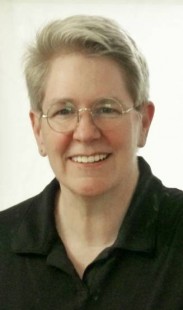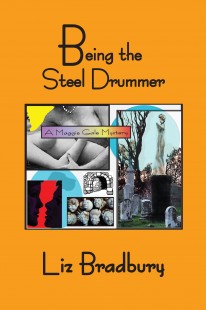
Author Liz Bradbury
BY LESBIAN.COM
After decades of lesbian activism, Liz Bradbury found another outlet to express herself: lesbian mystery fiction. That’s how the Maggie Gale Mystery Series was born. Two novels in, it’s no mystery, Bradbury’s books are a hit. Out Smart Houston Magazine called “Angel Food and Devil Dogs” “Perfect” and it was a Golden Crown finalist.
Besides her fiction, Liz Bradbury has written and had published over 400 nonfiction articles and essays on LGBT issues. She wrote regular columns in several LGBT publications, founded the Medusa Literary Society, edited Sinister Wisdom Magazine and judged in the 2012 Kissed by Venus short story competition.
As an advocate for the LGBT community, Bradbury has worked to successfully pass pro-LGBT legislation. She speaks frequently on LGBT rights and is an expert on same-sex marriage equality (and the lack of it) in Pennsylvania.
You’re a lesbian activist by day, writer by night. You’ve been a professional lesbian for decades now. How does your civil rights work inform your writing?
Yes, I’ve been a professional lesbian for quite a while. I ran my grad school GSA committee in the 1970s. My wonderful spouse of 25 years, Patricia Sullivan, and I began Pennsylvania Diversity Network, a LGBT advocacy organization, in 2004. Before that we ran part of a LGBT political organization for 10 years. I’ve published a LGBT newspaper for 15 years and now I write Lesbian fiction. Being a lesbian informs and influences every part of my life, my family, my work, what I create, everything I do.
 The second of your Maggie Gale Mystery Series, “Being the Steel Drummer,” is fresh off the presses, how did you get started writing lesbian fiction?
The second of your Maggie Gale Mystery Series, “Being the Steel Drummer,” is fresh off the presses, how did you get started writing lesbian fiction?
I love classic mysteries, but they never spoke to my life. So I began writing a mystery that I’d want to read. It took me a while to get into it until I realized I could include a love interest and write sexy erotic scenes into the plot, then it all became more fun.
Your first book in the series, “Angel Food and Devil Dogs,” got rave reviews. How do you top yourself?
It’s tricky because this is a romance series as well. Writing the second book in a romance series is tough because in the first, every glance and brush of a hand is exciting, but that changes as the relationship matures. It’s harder to make the love story tantalizing. But, readers also enjoy reading about characters they already know, in a world they recognize. So the task is to write a good story with enough variations and surprises to keep the reader interested.
“Being the Steel Drummer” features a dual mystery and romance with a second story about lesbians living just after the Civil War. Their relationship turns out to relate to the contemporary story. How did that come about?
In “Being the Steel Drummer,” Maggie and Kathryn find some journals that unfold an 1870s lesbian romance that took place right in their neighborhood. It all links up to a small sculpture Kathryn buys at a flea market. It turns out to be by one of the 19th century lovers who was a famous sculptor. The rest you’ll have to read for yourself.
And you’ve included real historic figures?
Yes! In the 1800s, there was a significant number of women artists, many of them Lesbians, who worked together in Rome and the United States. They figure in the story, as does Charlotte Cushman, who was a very famous Shakespearean actor of the day, and who often played men’s parts.
Charlotte Cushman was like a 19th century lesbian Hugh Hefner, right?
She was. In the 1860s, Charlotte Cushman had many passionate real life female lovers who were artists and poets. In “Being the Steel Drummer,” Cushman interacts with the fictitious characters and, of course, that part I made up, but it was interesting to research the lives of these lesbian artists and weave them into the story. I try to write books that leave you feeling as though you got your money’s worth. I like something that gives you a little brain exercise.
Is Maggie Gale based on anyone in particular? How do you develop your characters?
Maggie isn’t based on anyone, but I wanted her to be a strong, smart, creative, unabashedly out and proud lesbian who has some internal flaws, but is generally the kind of person you’d like as a friend. Too many lesbian characters in books I’ve read are such wrecks; they hate themselves, they’re estranged from family, they constantly make bad choices, they’re out of touch with their sexuality. I wanted a character whom readers would root for, not a depressing mess.
You created a publishing company to publish your books yourself. Why take that route? Is this something other lesbian writers should try?
Lesbian writers can create a career by self-publishing. E-books have made that possible. Amazon Kindle pays me a 70 percent royalty for any book priced over $2.99. Self-publishing does mean I have to do all my own PR, but most publishing companies require you to do most of your own promotion anyway, especially after the initial release. Established companies also press authors to produce books rapidly, sometimes expecting 2 or even 3 a year, which can sacrifice the quality of the writing. And many companies expect you to stick with a story formula, which you may not want to do. I didn’t.
On the other hand, the companies take care of the editing and do all the stuff you probably don’t want to do, like typesetting and cover design. But they don’t pay you nearly what you can make on your own.
To make a living by self-publishing lesbian genre fiction, you’ll have to start by writing a good mystery, romance, or thriller with some hot love scenes. Be honest about whether it’s well written and make real changes if it isn’t. Hire someone to edit it. Publish it in hard copy through Create Space or Lightning Source and also as an e-book. Ninety percent of your income comes from e-sales.
Seriously market your books on the Internet. Publish at least 5 or 6 good books. The more good books you publish the more money you’ll make.
I’m grateful that Catherine M. Wilson, the author of “When Women Were Warriors,” converted my book to the Kindle format. She and I created a group called Medusa Literary Society for Fiercely Independent Lesbian Publishers, which shares self-publishing information with other Lesbian writers.
You make it sound easy.
Well, it’s not, really. For one thing, it’s like having homework every night of your life. And you’re really putting yourself out there. But for writers, it’s a real possibility.
Do you read your reviews?
I pay attention to readers. If they have something legitimate to say, I want to hear it. All the professional reviews I’ve gotten have been quite good. In fact, I just got a wonderful one from Salem West at The Rainbow Reader.
What about LGBT cyber-bullying in reviews?
Everyone gets bad reviews now and then, it’s part of the job. People who don’t like my writing style certainly have a right to express their opinion. The problem is anonymous trolls. It’s what they call people who write flame reviews to harass, not to edify other readers. For example, I got a review of “Being the Steel” that intentionally misrepresented, misstated, and flat out made up phony things in the book and then harshly criticized them in a way that was seemingly aimed at trying to cut sales. It was clearly leveled at me because I’m a lesbian activist, which the reviewer mentioned several times.
There were a half dozen blatantly untrue statements in the review. It was like someone saying in a review of the Wizard of Oz, “I hated Dorothy because she shot the lion with a shotgun.”
How erotically graphic do readers want you to be?
I get a lot of mail from readers. A few would prefer to have no sex at all. They’d rather the couple “closed the door.” And a few want it to be porn or at least unbridled erotica. But, most readers tend to want intimate sweet scenes that build to hot and sexy, but are not cringingly clinical. The most important requirement for nearly all lesbian readers is that the physical love scene needs to be an integral component of the larger story.
What are some quirky inside things about your work that readers should know?
I named my publishing company Boudica Publishing because I firmly believe that the name of the heroic 6-foot-tall British woman warrior Queen of the Iceni, Boudica (Bo-dik-a), is where the term word “bull-dyke” comes from. Therefore, the word dyke pays homage to a hero.
I always capitalize “Lesbian” because the word is not just an adjective, it describes a culture, like Latino.
Maggie’s last name is Gale, after Dorothy Gale.
It’s an alphabetical series whose book covers will make a rainbow, the next book is called “C-Notes and Ski Nose” and will have a yellow cover.
What’s in the future for you and Maggie Gale?
Lots of sales, I hope. The first book in the series, “Angel Food and Devil Dogs,” is on sale now on Kindle for just 99 cents. I’m currently promoting “Being the Steel Drummer,” so if any book clubs, festivals, stores, community centers, lesbian retirement communities, etc., want me to come and do a reading of the book and talk about self-publishing and LGBT activism, I hope they’ll contact me. I’ll go anywhere on the east coast, and Skype anywhere else.






